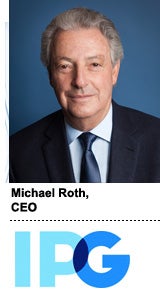 IPG took a hit in revenue last quarter as cost-cutting clients opted to forego agency-of-record (AOR) relationships in favor of working project by project.
IPG took a hit in revenue last quarter as cost-cutting clients opted to forego agency-of-record (AOR) relationships in favor of working project by project.
Unfortunately for IPG, that business model doesn’t provide a consistent revenue stream, as it gives clients the ability to stop their projects.
“During the third quarter, several of our largest clients continued to defer or cancel project spending, which particularly weighed on the growth of our digital and marketing services disciplines,” CEO Michael Roth said on the company’s third-quarter earnings call Tuesday. “There’s no question that there are clients out there that are viewing the AOR relationship a little differently and tend to be more project-based businesses than historically.”
Organic growth for the quarter was flat at 0.5% and came in at 1.1% for the first nine months of 2017. Reported revenue was down 1% from $1.92 billion to $1.9 billion for the quarter and down 0.7% from $5.58 billion to $5.54 billion for the first nine months of the year.
While creative agencies like McCann maintain longstanding AOR relationships, clients generally favor IPG’s open architecture model, which pulls together teams of bespoke talent across agencies to focus on their business, Roth said. Project work is a more natural fit for the model, he said.
“The last few pitches I’ve seen, even when they start out as media RFPs, clients are looking for open architecture solutions where we can bring other resources from IPG,” he said. “That’s the opportunity for our business.”
But project work is less predictable than AORs as clients can pull back on projects at the last minute. IPG forecasted growth for the year based on a few projects that didn’t come through, causing it to lower its original guidance of 3%-4% for 2017 to 2%.
“We will, of course, strive to do better, but we feel these are appropriate goals as we head into the always important fourth quarter,” Roth said.
Media continues to be one of IPG’s highest-performing sectors. Although IPG didn’t break out numbers for Mediabrands or UM, Roth said they showed “notably strong performance,” with UM wining the Spotify account in the US.
“All of the confusion in the marketplace needs an independent view of where clients should spend their money,” he said. “Media is where all the action is happening right now.”
Still, media continues to experience pricing pressure, Roth said, but stressed that it has nothing to do with rebates or nontransparent activities.
“We run a pure agency media model, with no owned media inventory,” he said. “Some of our peers resell owned media at a profit.”
Roth briefly addressed cost-cutting by CPG and food and beverage clients, whose “significant reductions in client spend” were a cause for short-term pressure. But he also noted that the tech and telecom sectors were weaker because IPG is cycling through client losses.
Roth again addressed consulting firms as a partnership opportunity rather than a threat. While consulting firms are often in pitches relating to CRM and digital transformation, IPG doesn’t encounter them in most pitches, he said.
“I’ve always said I think it’s better for those firms to partner with us than compete with us,” he said. “I’m still waiting for my phone call.”
But even if consulting firms do continue to grow their share of marketing services rather than partner with holding companies, Roth is confident in the company’s ability to compete, especially on creative.
“The firepower we have on the creative side of the business and how it’s embedded in what we do is going to be very difficult to unseat by these particular companies,” he said.












